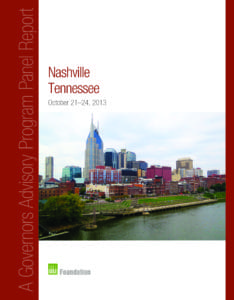Top Story
 Date: October 21-24, 2013
Date: October 21-24, 2013
Location: Nashville, Tennessee
Sponsor: ULI Foundation
Subject Area: Economic Development, and urban infill.
Panel Chair:
Richard W. Reynolds
Principal
The Reynolds Group Inc.
Boston, Massachusetts
Background and Panel Assignment
The challenges that Nashville poses for urban infill development and redevelopment make suburban greenfield development more attractive and less expensive. Yet the city is interested in promoting higher-density urban redevelopment as a more environmentally sustainable form of development and because it costs the government less
per capita to service and maintain infrastructure in higher density areas and generates increased tax revenues.
Currently, urban developers, property owners, residents, and consumers living in the urbanized centers of Nashville appear to pay a disproportionate share of maintenance
costs and are in effect subsidizing suburban development and lifestyle. The city would like to address that inequity. Given the situation outlined above, ULI Nashville sought
advice on an overall approach to redevelopment and infill development in Nashville’s urban center, focusing on questions of fiscal responsibility and sustainability. In that
vein, the ULI panel was asked to respond to the following
questions:
- Are practices, tools, and incentives available that would expand opportunities for urban redevelopment and infill development for when the market is not as strong so Nashville can be best prepared for its future demands?
- What opportunities, practices, tools, and incentives would increase opportunities for urban infill and redevelopment of those areas of the core that are not benefiting even now because of market forces?
- How do we remove barriers to successful development of the type and nature that supports the changing demographics and demands in places that have the highest return to the community?
- Do opportunities exist to change and begin to balance the disproportionate municipal cost/revenue model of suburban/low-intensity development when compared to urban redevelopment/higher-density infill (i.e., reduce the subsidy of high cost/low revenue development)?
Summary of Recommendations
To continue working out such “disconnects” and best prepare for the longer-term future, the panel focused on seven major areas that need attention and that are expanded upon in the report:
- Mass transit: The panel felt that, above all other recommendations, increased focus on mass transit is needed. The longer-term future of greater Nashville will, in large measure, be determined by the implementation of mass transit. Given the long lead times required, the commitment to mass transit must begin immediately.
- Corridor differentiation: Although the panel appreciates that the “corridor” planning and development concept is appropriate for Nashville given the historic realities, the panel likewise believes that more differentiation is needed in both planning and implementation along those corridors as well as an evaluation of how much density is desirable and in which locations.
The panel suggests that more focus should be given to key nodes or neighborhoods based on market demand and impact on the overall community.
- Funding: The panel urges the city not to focus on TIFs for individual projects, but rather to think in terms of funding public realm improvements for larger neighborhoods, whether through TIFs or simply general obligation bonds.
- Coordination: Although Metro government has been doing a very good job of supporting development, a single point of coordination responsibility is needed to manage the nexus of planning and implementation of all public sector actions with respect to redevelopment and infill.
- Communication: An increased effort to communicate with the community about the need for adaptation to change is critical.
- Redevelopment and infill: Additional specifics might be used in a “toolkit” for promoting redevelopment and infill.
- Education: The ability of Nashville/Davidson County to continue to attract new residents will also depend significantly on the quality of educational opportunities for their children.